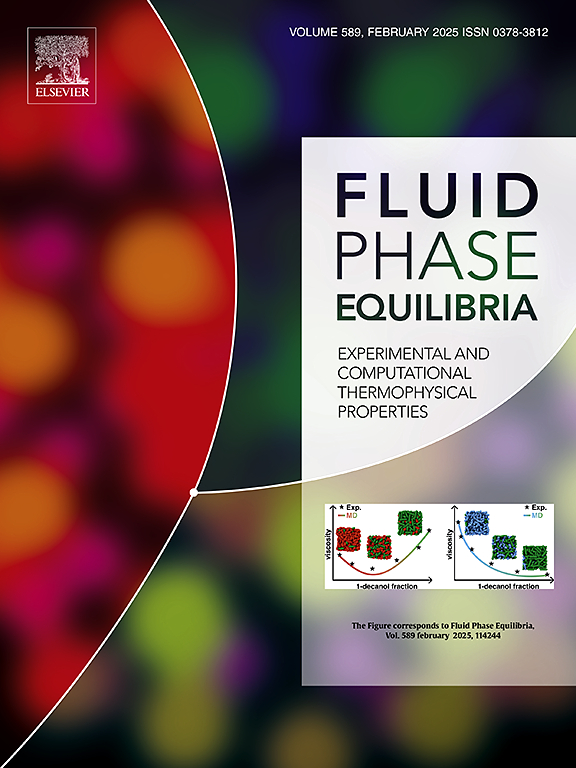Separation of azeotropic mixture using a novel hybrid entrainer based on deep eutectic solvents
IF 2.8
3区 工程技术
Q3 CHEMISTRY, PHYSICAL
引用次数: 0
Abstract
In recent years, deep eutectic solvents (DESs) have emerged as environmentally friendly distillation entrainers. However, most research has focused on pure DESs, and developing new DESs remains challenging. This process requires significant time to screen suitable hydrogen bond donors and acceptors. This study explores a hybrid approach to enhance the efficacy of single DESs. Using the widely studied ethanol/water azeotropic mixture as a model system, Choline chloride (ChCl):urea (1:2, mol/mol) was selected as the benchmark entrainer. Among the 13 inorganic salts tested, CaCl2 was chosen as an additive to prepare a hybrid entrainer (5 wt% CaCl2 + 95 wt% ChCl:urea). Increasing the hybrid entrainer content from 0 to 36.9 wt% resulted in a 270% increase in relative volatility, outperforming pure DESs. This hybrid approach demonstrates potential to reduce ChCl:urea usage by 50%. Vapor-liquid equilibria were determined, with a good fit between experimental and theoretical data using the NRTL model.
基于深共晶溶剂的新型杂化夹带剂分离共沸混合物
近年来,深共晶溶剂(DESs)作为一种环保型的蒸馏夹带剂出现了。然而,大多数研究都集中在纯DESs上,开发新的DESs仍然具有挑战性。这个过程需要大量的时间来筛选合适的氢键供体和受体。本研究探讨了一种混合方法来提高单一DESs的疗效。以广泛研究的乙醇/水共沸混合物为模型体系,选择氯化胆碱(ChCl):尿素(1:2,mol/mol)作为基准夹带剂。在测试的13种无机盐中,选择CaCl2作为添加剂制备混合夹带剂(5wt % CaCl2 + 95wt % ChCl:尿素)。混合夹带剂的含量从0 wt%增加到36.9% wt%,相对挥发性增加270%,优于纯DESs。这种混合方法显示出将ChCl:尿素使用量减少50%的潜力。利用NRTL模型确定了气液平衡,实验数据与理论数据吻合良好。
本文章由计算机程序翻译,如有差异,请以英文原文为准。
求助全文
约1分钟内获得全文
求助全文
来源期刊

Fluid Phase Equilibria
工程技术-工程:化工
CiteScore
5.30
自引率
15.40%
发文量
223
审稿时长
53 days
期刊介绍:
Fluid Phase Equilibria publishes high-quality papers dealing with experimental, theoretical, and applied research related to equilibrium and transport properties of fluids, solids, and interfaces. Subjects of interest include physical/phase and chemical equilibria; equilibrium and nonequilibrium thermophysical properties; fundamental thermodynamic relations; and stability. The systems central to the journal include pure substances and mixtures of organic and inorganic materials, including polymers, biochemicals, and surfactants with sufficient characterization of composition and purity for the results to be reproduced. Alloys are of interest only when thermodynamic studies are included, purely material studies will not be considered. In all cases, authors are expected to provide physical or chemical interpretations of the results.
Experimental research can include measurements under all conditions of temperature, pressure, and composition, including critical and supercritical. Measurements are to be associated with systems and conditions of fundamental or applied interest, and may not be only a collection of routine data, such as physical property or solubility measurements at limited pressures and temperatures close to ambient, or surfactant studies focussed strictly on micellisation or micelle structure. Papers reporting common data must be accompanied by new physical insights and/or contemporary or new theory or techniques.
 求助内容:
求助内容: 应助结果提醒方式:
应助结果提醒方式:


